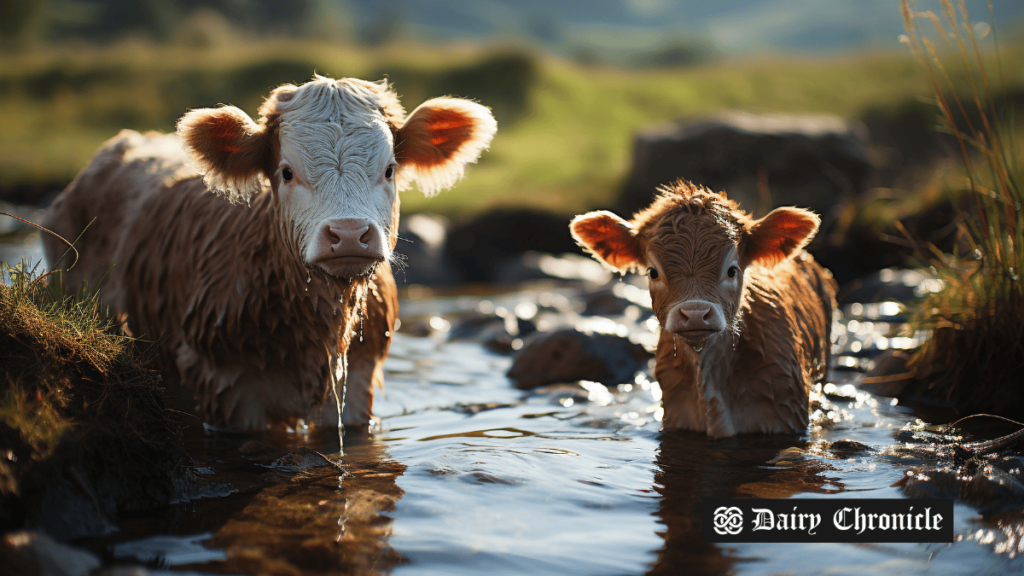Winter brings unique challenges for calf raisers, but providing warm water is essential to maintaining calf health and supporting rumen development. Calves consume more water in warmer conditions, which boosts their growth and enhances starter grain intake. The importance of hydration, especially in dry, cold weather, cannot be overstated for optimal calf growth.
As winter approaches, calf raisers face the challenges of maintaining calf health and growth during the colder months. One of the most critical yet often overlooked aspects of calf care is ensuring adequate water intake, particularly when temperatures plummet. Despite the freezing weather, calves continue to require hydration to maintain optimal rumen development, nutrient absorption, and overall health. However, this task becomes more difficult as water freezes and becomes harder to deliver efficiently.
Key Points:
- Importance of Water for Rumen Development: Water plays a crucial role in the development of the rumen, which is essential for nutrient digestion and the absorption of dry matter. Proper hydration helps calves develop a healthy rumen, which supports better feed intake and weight gain. When preweaned calves have access to free-choice water, they consume about four times the amount of water as their dry matter intake. This is critical for their growth and development, even during winter months.
- Water Temperature Affects Consumption: Cold temperatures not only affect the accessibility of water but also the amount of water calves drink. Research has consistently shown that calves prefer warmer water, with a study indicating that preweaned calves consumed 47% more water when offered water warmed to around 63°F compared to 45°F. Cold water can discourage water consumption and disrupt the digestive process, so providing water closer to body temperature (100–102°F) ensures better hydration and supports rumen activity.
- Cold Water and Its Impact on Rumen Function: When calves drink cold water, the temperature in their rumen drops, which can interfere with the natural digestive processes. Studies have shown that drinking water at 45°F can lower the rumen temperature significantly, requiring up to an hour for it to return to normal body temperature. This process can slow down digestion and reduce the efficiency of nutrient absorption, ultimately affecting calf growth.
- Energy Conservation with Warm Water: During winter, calves use more energy to maintain their body temperature. By offering warm water, farmers can reduce the energy demand on calves, as they do not need to warm up cold water to rumen temperature. This helps calves retain more energy for growth and development rather than spending it on warming cold water, especially when food intake may decrease due to the cold.
- Increased Water Intake and Better Starter Grain Consumption: Offering warm water not only boosts water intake but also enhances starter grain consumption. As calves drink more water, their rumen environment stabilizes, and they are more likely to eat starter grains, which are vital for their rumen development. Additionally, the fermentation of starter grain in the rumen generates heat, helping calves stay warmer in cold conditions. Providing a third water feeding in addition to milk or milk replacer can help ensure calves receive enough hydration to support their growth.
- The Dry Winter Air: Cold, dry winter air leads to increased moisture loss through a calf’s breath, which exacerbates dehydration. Unlike warmer months, when moisture levels are higher, the dry air in winter causes calves to lose more water with every breath, making it even more important to provide ample hydration. This moisture loss can be compounded by the challenges of frozen water sources and reduced access to water, further stressing the importance of consistent water provision.
- Overcoming Frozen Water Sources: Delivering water during freezing conditions presents challenges, but with proper planning and equipment, it is possible. Maintaining a consistent water-feeding schedule—offering water at the same times each day—helps calves establish a routine and ensures they receive the necessary hydration. Observing the calves’ water consumption patterns in the winter allows farmers to make adjustments, such as using heated water troughs or bringing water inside to keep it from freezing.
- Optimizing Calf Growth and Health: Adequate hydration is directly linked to the health and growth of calves. Ensuring calves receive enough warm water throughout the winter helps maintain their hydration levels, supports their rumen development, and improves their overall well-being. Well-hydrated calves are less likely to experience digestive issues, stress, or setbacks in their growth. In addition, providing warm water encourages greater starter grain intake, which enhances their ability to grow and gain weight more effectively.
- Long-Term Impact on Dairy Productivity: Proper calf hydration in winter can lead to better long-term outcomes for dairy farms. Calves that are well-hydrated and nourished in their early life stages are more likely to grow into healthy, productive heifers and cows. Ensuring their hydration and nutritional needs are met during challenging winter conditions lays the foundation for improved milk production and overall herd health in the future.
In conclusion, turning up the heat on winter calf water is a crucial aspect of calf care. By providing calves with warm, accessible water, farmers can support rumen development, enhance starter grain intake, and improve overall health and growth, ensuring that calves thrive even in the colder months. By investing in warm water and consistent care practices, calf raisers can help their young stock meet their full potential and set them up for a lifetime of productivity.
